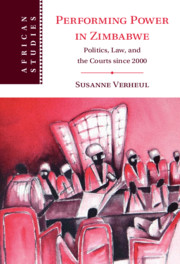Book contents
- Performing Power in Zimbabwe
- African Studies Series
- Performing Power in Zimbabwe
- Copyright page
- Dedication
- Contents
- Figures
- Acknowledgements
- Abbreviations
- Introduction
- 1 History, Authority and the Law in Zimbabwe, 1950–2002
- 2 ‘Rebels’ and ‘Good Boys’
- 3 ‘Zimbabweans Are Foolishly Litigious’
- 4 ‘What Is Abnormal Is Normal’
- 5 Material and Sensory Courtrooms
- 6 The Trials of the ‘Traitor’ in Harare’s Magistrates’ Courts under the Unity Government
- 7 History, Consciousness and Citizenship in Matabeleland
- 8 Historical Narrative and Political Strategy in Bulawayo’s Magistrates’ Courts
- Conclusion
- Bibliography
- Index
- African Studies Series
8 - Historical Narrative and Political Strategy in Bulawayo’s Magistrates’ Courts
The Case of Owen Maseko
Published online by Cambridge University Press: 31 August 2021
- Performing Power in Zimbabwe
- African Studies Series
- Performing Power in Zimbabwe
- Copyright page
- Dedication
- Contents
- Figures
- Acknowledgements
- Abbreviations
- Introduction
- 1 History, Authority and the Law in Zimbabwe, 1950–2002
- 2 ‘Rebels’ and ‘Good Boys’
- 3 ‘Zimbabweans Are Foolishly Litigious’
- 4 ‘What Is Abnormal Is Normal’
- 5 Material and Sensory Courtrooms
- 6 The Trials of the ‘Traitor’ in Harare’s Magistrates’ Courts under the Unity Government
- 7 History, Consciousness and Citizenship in Matabeleland
- 8 Historical Narrative and Political Strategy in Bulawayo’s Magistrates’ Courts
- Conclusion
- Bibliography
- Index
- African Studies Series
Summary
Chapter 8 focuses on a second interaction between Gukurahundi history, law and citizenship by looking at the trial of visual artist Owen Maseko. For his exhibition on the experiences of Gukurahundi, Maseko stood accused of ‘inciting tribal hatred’. In their courtroom narratives, prosecutors elaborated on this accusation to communicate ZANU-PF’s continued control over instruments of coercion to a ‘Matabele’ audience. Maseko and his defence team, in turn, performed in a rule-bound manner to draw attention to Maseko as a citizen with the freedom to express his interpretations of history, and to put these in the public domain for debate, rather than as a ‘criminal’ for failing to align with ZANU-PF’s historical narrative. These different forms of courtroom performance highlight how the Gukurahundi as a violent historical event continued to inform negotiations over citizenship, and the understandings of law’s legitimacy and state authority that they encompassed, in this region.
- Type
- Chapter
- Information
- Performing Power in ZimbabwePolitics, Law, and the Courts since 2000, pp. 206 - 227Publisher: Cambridge University PressPrint publication year: 2021

